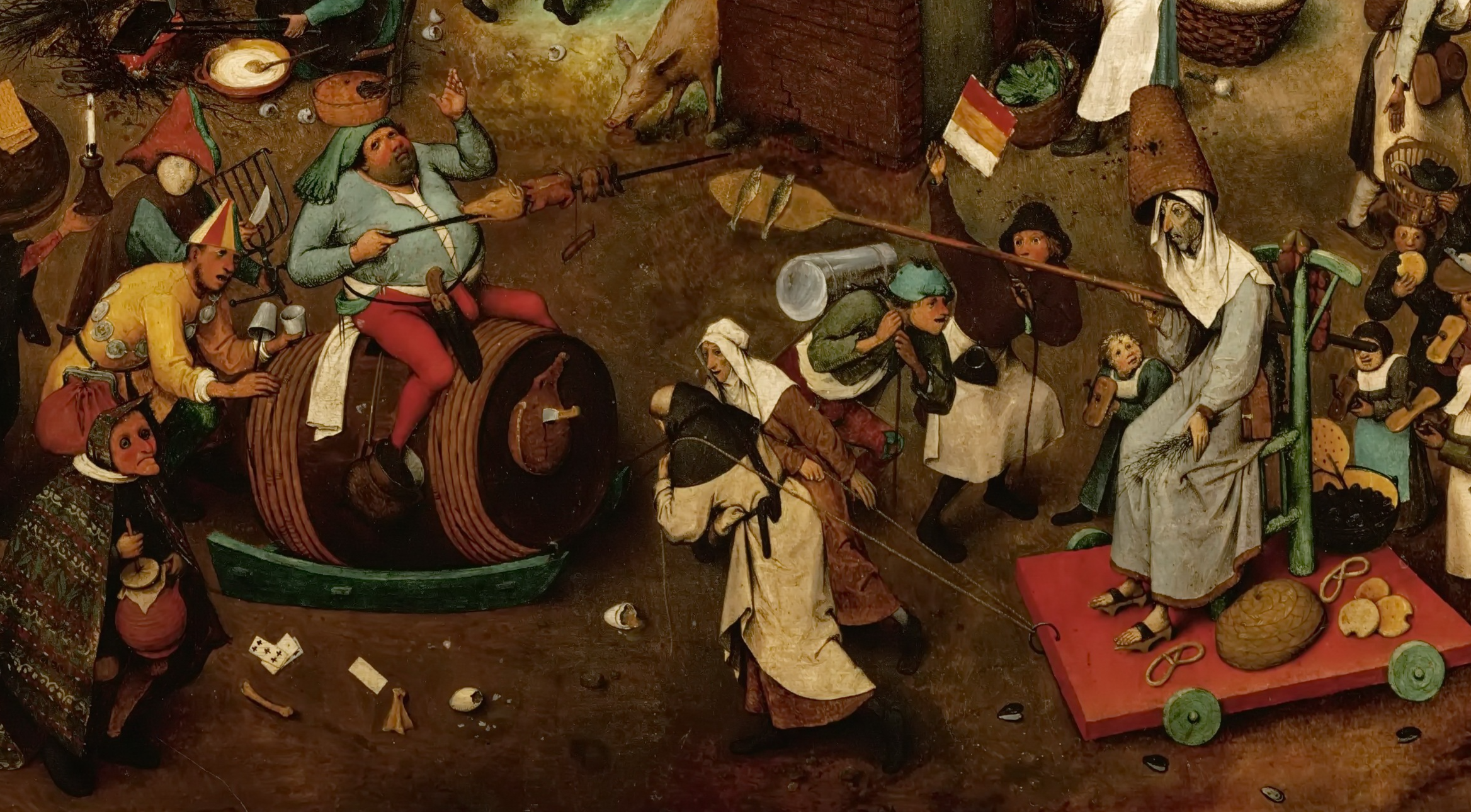About the image: Detail from Pieter Bruegel’s depiction of “The Fight Between Carnival and Lent” (1559).
On March 9, 1522 (Invocavit Sunday), a printer in Zurich named Christoph Froschauer shared supper with some of his employees. Since it was Lent, they ate the traditional Fasnachts-Chüechli (delicious flakey cakes), and then perhaps some of the Mehlsuppe (“flour soup”) that is still served in Switzerland this time of year. Froschauer’s printshop had been working overtime on an order for Erasmus and the meager provisions permitted during Lent did not satisfy the hungry men. So Froschauer sliced up some year-old smoked sausages and passed those around. Their pastor, Huldrych Zwingli, was also there, though apparently Pastor Zwingli did not partake of the sausage.
And so began the Zwinglian Reformation in Switzerland!
Eating that sausage—publicly, defiantly, brazenly!—crossed an important line because it ignored the church’s laws concerning the pre-Easter time of fasting. Whether Zwingli himself ate any of the revolutionary sausage or not, Froschauer and the others had been listening to Zwingli’s preaching, in which he urged the Bible’s authority over all human commands and traditions. Another Zwingli sermon would follow two weeks after the “affair of the sausages,” this one specifically on fasting and the freedom to choose foods without compulsion. Soon the bishop was involved, trying to restrain the revolutionary libertines of Zurich, but it was too late. The Reformation gained a lasting foothold in some of the Swiss cantons. (Young teachers and some students at the university of Basel would join the movement on Palm Sunday, escalating the disregard for the Lenten fast with a feast of roast suckling pig, which sounds somewhat more appetizing than the year-old sausages.)
The famous Wurstessen (usually described daintily in English as “The Affair of the Sausages”) has left its mark on Swiss culture. Protestant cantons such as the cities of Zurich and Basel celebrate their annual carnivals during Lent, not before. The Basel Fasnacht, which begins at exactly 4:00 a.m. on the Monday after Ash Wednesday, has been declared “Intangible Cultural Heritage” by UNESCO. The Swiss Protestant “Mardi Gras” happens when New Orleans, Rio de Janeiro, and other cities are nursing hangovers and sweeping up the trash after their big parties.
Lutherans seem to have an ambivalent relationship to Mardi Gras and carnival. On the one hand, most Lutherans seem as willing as anybody to laisser les bon temps rouler (within some bounds of propriety, and perhaps not in French). We are happy for pretty much any excuse to (over-)indulge in God’s good gifts of food and drink. (How about a cigar with that? What happens in Vegas stays in Vegas…) After all, we are justified by grace through faith, so a little bit of drunkenness and gluttony will not really do us much harm, right?
On the other hand, as much as we are ready to roll with the carnival, I think we may actually prefer Ash Wednesday and the Lenten season ahead. The more Sundays after Epiphany there are on the calendar, the more the last one (or two, or three) become a sort of pre-Lent warm-up in our preaching. Our Lenten hymnody is enormously rich. We seem happier when we are in penitent mode than when we are whooping it up with drinks, beads, and confetti. This is yet another way Lutherans are out of step with their other Protestant cousins: Why would we want to interrupt a good, somber Lent with feasting and frivolities?
The Lutheran Reformation, we all know, was launched when a German monk posted a provocative set of academic theses against indulgences. We view this as bold and defiant in retrospect, but at the time it was Prof. Luther doing what professors did: calling for debate and discussion. When you set that event side by side with The Affair of the Sausages, the Lutheran version seems cerebral and theoretical by comparison. It takes some subtlety for people to grasp the connection between indulgences and the Gospel; but a simple man readily comprehends that being allowed to eat sausage (or roast pig) during Lent is a great step forward for the freedom of a Christian. Zwingli was not an academic, and his Zurich parishioners certainly were not; their version of the Reformation has a kind of visceral appeal, perhaps.
And yet perhaps Luther’s pen was mightier than a Zürcher Rauchwurst after all. On the very same day Froschauer & Co. were enacting their Christian liberty with mouthfuls of spicy smoked wurst, Luther was mounting his pulpit in Wittenberg to mend the damage done by his colleague Carlstadt while Luther was lying low at the Wartburg. Carlstadt had wreaked some havoc in the name of Christian freedom, and now Luther was home to try to clean it up. He preached repentance every day for a solid week, and I am fairly certain that no sausage supper followed the services. Luther called the people back to the real-world tension between Gospel freedom and Christian responsibility. That’s a perennial Lenten problem, and not just for Lutherans. You can read all about it in the Invocavit sermons in volume 51 of the American Edition of Luther’s Works.


Leave a Reply
You must be logged in to post a comment.